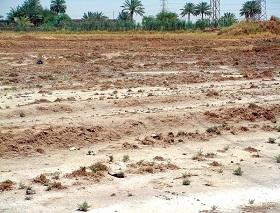Using AI to control energy for indoor agriculture
30 September 2024
Published online 27 May 2012

The Epic of Atraasis, an ancient Babylonian story tells of how fields in ancient Mesoptomia turned white after salt seeped into the soil.
Almost four thousand years later, Iraq is losing valuable farming land to rising levels of salinity in soil and groundwater due to a failing drainage infrastructure that has fallen into disrepair.
In December 2010, the Iraqi government called on local and international organisations to conduct research to improve the management of saline soil and water resources. "The Iraq Salinity Project is an initiative taken by the International Centre for Agricultural Research in Dry Areas (ICARDA)," says Luigi Cavestro, project coordinator. "Currently, it's estimated that 25% of Iraq's irrigated land — 2 million hectares — does not permit crop cultivation."
The land lost to salinity is causing food and income insecurity, affecting the poorest people most, he adds.
Financed by the Australian and Italian governments, the initiative is assessing the state of irrigation and drainage infrastructure. It will then offer advice on the best cultivation practices for different salt-tolerant crops, and develop ways to improve soil, irrigation and water and drainage management for salinity control.
The researchers had discussions with farmers to determine what problems they encountered and to see how they are dealing with the problem now. Cavestro expects the results of the research to be released by February 2013. "We are at an advanced stage of the research, but need to validate our results in the coming months."
The researchers are looking at five pilot sites in central and southern Iraq: Dijaila, Mussaib, Abu-Khaseeb, West Gharraf and Shat-al-Arab.
Cavestro is hopeful the initiative will guide Iraqi policymakers to best address the problem of salinity while "increasing agriculture production with long-term sustainable actions."
"This will probably take time. The project works at different levels — farmers, district, regional and national," he adds.
Mushtaqe Ahmed, director of the Center for Environmental Studies and Research in Oman, conducted an environmental salinity study for the Gulf state. He says the Iraq study is important for the whole region. "Salinity is a serious problem in the Arab world, especially in the Gulf states. The problem is there to stay. So the solution has to deal with how to live with salinity."
doi:10.1038/nmiddleeast.2012.78
Stay connected: